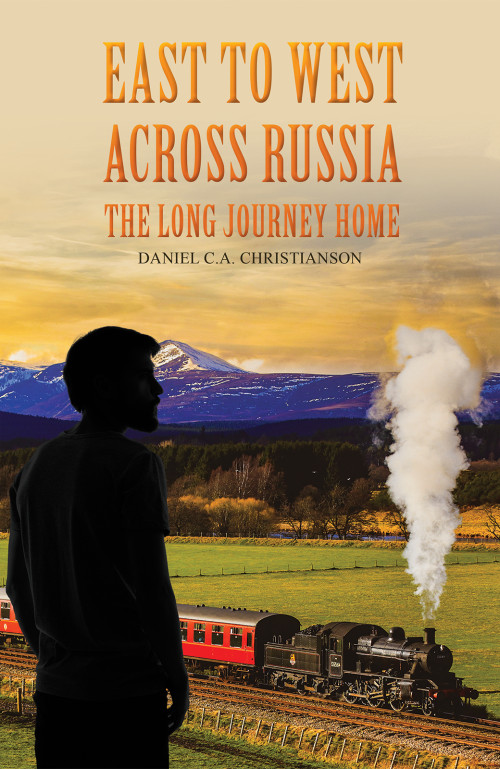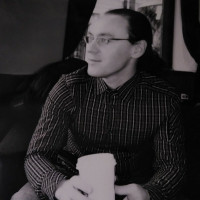
East to West across Russia: The Long Journey Home
Book Format: Choose an option
Free standard delivery on UK orders over £35
*Available directly from our distributors, click the Available On tab below

Book Format: Choose an option
Free standard delivery on UK orders over £35
*Available directly from our distributors, click the Available On tab below

He is a man of solitude. His world is that of the quiet and distilled. Each night, he sits at his desk as the clock strikes midnight. He journeys inward to that bottomless pit of conflict, prompted by memory, in search of an image fused with the imagination in order to reveal truth through character and the creative narrative process. The words become sentences and they are formed. And so it all begins. This was his first attempt and successful completion of a full-length book. His name is Daniel C.A. Christianson.
I cried so much after reading this gem of a story by an author named Christianson whom I have never heard of before. There is so much pain and anguish flowing through the pages of this novel. The author stated in his preface that it was based on a non fictional story but with fictional narratives spread across this memoir. I lingered on that scene in which the protagonist remembers his father and he does so by depicting the last moments of his life as he lays gravely ill in a hospital bed. D calls out for a miracle but it never comes and his father Thomas succumbs to the illness that plagued his body and tarnished his once working lungs. Christianson is a humanist and in his novel he is championing the goodness and core of what makes us uniquely human. The author does not shy away from showing the depths and depravity of human kind but he also shows the inner core of who we all are and what love and goodness exists there. I cried at the end when N departs D for the final time. It was a natural but tragic cessation.
Oh what a beautiful and captivating book this is. I read this book whilst interrailing through Europe last summer and what I loved most about this memoir is how the author was able to transport me there into the vast and endless plains of Siberia with the mesmerising silence and natural wonder that flowed from such tranquil places in our world. I was there standing and sitting alongside D as he was going through his existential crisis of melancholia when he was confronted with his past and his love for N. I pleaded with N to return to the arms of D and although she does make a brief appearance in Moscow within the final scene there is no happy and romantic ending for D and N. N fades away into the ether just like how she faded away from the heart of D. There is no happy ending to this novel. It is one of pain and loss but also there is so much hope in this story in how the author through his protagonist urges the reader to stop what they are doing in this life and to examine how one lives and if we are happy with such a life. Felicitations Mr. Christianson. C'est vraiment merveilleux.
I was told about this book from a work colleague. He said that there was a passage devoted to Judaism and a critique on the Holocaust. In a world that is becoming ever more violent, ever more frightening and at times without an underlying message I fear that we are going to return to that time in the world when the Jewish people will be attacked once more just like they were during the great onslaught by the Nazis onto the Jews in the Second World War. Christianson in this very honest and sweet memoir is pleading with the world to change our ways and to find that elusive path towards peace before it is too late. I applaud the author for the research that he carried out on Judaism and the sensitivity and historical knowledge that was necessary in order to show the reader a little of what my people went through when they were attacked and almost erased by the Nazis on European soil. The world said never again but we continue to be attacked. We need books like East to West and messages of condemnation so that we can see the world as it truly is.
I was told about this book back home in Germany last year. I had figured with Russia in the title that it was going to be a book filled with propaganda or heavily influenced with conflict and war. The very opposite was the case. It is a delightful memoir written by a love struck, lonely and deeply introspective man who we only know as D and who crosses Russia slowly while pining for his lost love N. I cannot figure out if this mysterious woman named N is a real life person or simply a hallucinatory and disturbed memory that D cannot let go of from his life. N plagues D wherever he goes in Russia and especially so along the distilled waters of Lake Baikal. He longs for her return and whilst she does make an appearance in the final scene I tend to believe just like others have postulated that such a vision of N by D only resides within his own melancholic and imaginary thoughts and that N simply represents an ideal that we all long for but few of us can ever reach. I would like to see this book in translation and especially so in my native German. I am very curious as to how it will read in the German dialect.
I have a love and an appreciation for the epistolary form of writing that has almost faded away in the early 21st century. Daniel C.A. Christianson's use of the epistolary form in his book East to West across Russia: The Long Journey Home suggests a deep appreciation for this mode of storytelling. Letters allow for a personal and direct connection to the reader much like the note addressed to "Dear Reader" in the book found by Emilia. The importance of the letter scene in Omsk next to the statue of the lovers and the note to "Dear Reader" indicate Christianson's interest in using letters to convey emotional depth and to connect with readers. I don't know if the letter written by D and addressed to "Dear N" is a real epistolary letter or one of fiction. I have not made up my mind on this yet. The romantic person in me wants this to be real but the reality is probably more aligned to the everyday and mundane realities of life. Christianson wants to keep alive this dying art form but it has faded away just like N faded away on the heated cobblestones of Red Square as the sun was setting on his journey across Russia. What a beautifully thought out and executed story if at times it was also bizarre.
I finished reading this book recently and came here to see what the reviews are like. The majority of the reviews question whether the character N is a real or fictional person. I cannot add anything to this debate as I am unsure if N is a real life person or simply a symbolic representation of idealised. Perhaps the truth lies somewhere in between. What has become fascinating for me is how copies of Christianson's book is turning up at various locations in Europe and more specifically at European literary sights like Weimar and the grave of James Joyce in Zurich. According to Christianson the copy of his book was left on a bench in Weimar as a gift to whoever might find it. Christianson wrote a note addressed to the reader expressing his desire to share his book and words with someone in Weimar. I think finding the book on a bench evokes a sense of serendipity in which it connects the finder with the author's words and thoughts in an unexpected way. I think Christianson deliberately chose Weimar to place the copy of his words as it is a city with a rich and cultural history and Christianson in placing his words at Weimar cemetery is honouring the lives of Goethe and Schiller who are buried there close to that bench. Both Goethe and Schiller are icons of Weimar's cultural heritage. I think that Christianson in leaving his book in such a location could imply a desire to connect with others who appreciate literature, spirituality and cultural history. I was not one of those lucky people who found this book resting on a bench or on the grave of James Joyce but I am so happy that I have found this book as I really enjoyed it.
I found this quite a bleak but at the same time quite an inspiring story. The protagonist D seems to have reached a crossroads in his life and seems to be tired of the modern world and its excesses. He decides to go to the largest country in the world and delve specifically in the remote and natural beauty of siberia where his metamorphosis begins. I don't think he is pining for a lost love. There is nothing tangible about the character N. She only exists in the mind and memories of D. Instead, he longs for a new way of living and that centres around a life of morality and love for one's fellow human beings along with an inner attachment to the soul within nature. D knows that his time is finite and that he must return to the real world but he can do so in the knowledge that he has chosen to dedicate his life to art and that of a writer. N is symbolic of his old life but he must leave that old life behind to become a man of words.
I want to join the debate of many other reviewers in discussing the mysterious N from Christianson's novel. I don't see her as a real life person either. If she was real then it does not make sense not to give her a voice. I thought at first N is symbolic of lost love but I changed my mind after the final scene when N fades away from D's existence. I feel N is connected to the sublime vastness and utter beauty from the natural world. N is not something tangible that we can feel in this world. Instead, she is something beyond our reach but when we retreat into nature we are connected to such rare beauty and therein we get to experience whom D simply refers to as N or his great love. Christianson's character D is going through an existential crisis and an inner turmoil particularly at Lake Baikal. It is there that N has her birth and she does not depart from D's life until the sun sets on Red Square in Moscow at journeys end. The essence and energy and complex beauty of N drive's D's introspection helping him navigate from fear to creativity and authenticity. N is not portrayed as a fully fleshed out character but as a symbol of D's emotional state and past relationships. N's influence permeates D's thoughts, emotions and interactions with the Russian landscape. It is a marvelous way of telling a modern love story by connecting it to loss of love. I enjoyed it very much.
We use cookies on this site to enhance your user experience and for marketing purposes.
By clicking any link on this page you are giving your consent for us to set cookies